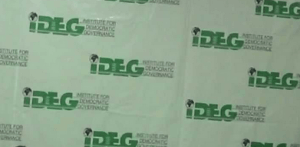IDEG, others to propose measures to “sanitise” airwaves
 The Institute for Democratic Governance (IDEG) in collaboration with other partners will hold a roundtable discussion on Tuesday, June 25, 2024 to explore proposals for addressing the abuse of the media space.
The Institute for Democratic Governance (IDEG) in collaboration with other partners will hold a roundtable discussion on Tuesday, June 25, 2024 to explore proposals for addressing the abuse of the media space.
The discussions will focus on measures to reform media regulations, enhance professionalism and integrity to ensure peaceful and credible elections in 2024.
Some 70 participants from the National Media Commission (NMC), National Communication Authority (NCA), Civil Society Organizations (CSOs), professional organisations, media, Ministry of Information, Ghana Independent Broadcaster Association (GIBA) are expected to participate in the discussion.
Since the return to multi-party democracy in 1992, Ghana has successfully held eight competitive elections with three peaceful transfers of power.
Despite these successes, there is broad consensus among interested parties that the nation’s electoral system needs reforms. Over time, it has become evident that there are severe structural defects that require urgent reforms.
The 2020 Presidential and Parliamentary elections were deemed transparent, peaceful and credible, albeit some infractions were identified by both international and local election observers.
The European Union Election Observer Mission (EUEOM), for instance, identified gaps in Ghana’s electoral process and made eighteen (18) recommendations to improve the credibility and transparency of future elections.
Key among the recommendations is limiting the role of the NCA and transferring its licensing and sanctioning powers to the NMC.
The ultimate goal of this recommendation is to establish a sole and completely independent media regulatory authority that is responsible for allocating broadcasting licenses, analyzing broadcasting content, and addressing media-related complaints.
This recommendation emerged as a result of the polarization of the media space, unprofessionalism and the lack of enforcement of media or journalistic standards.
In the lead-up to elections 2020, there was significant abuse of the media space by political parties and the media.
This abuse took many forms, including the use of hate speech and disinformation to attack political opponents; the spread of fake news and propaganda; the use of social media to inflame tensions and incite violence; and the unfair coverage of the election by some media outlets.
State monopoly of the media and the influence of the government also created an uneven playing field for parties to air their manifestoes.
These issues created an atmosphere of fear and intimidation, which made it difficult for people to freely express their political views.
It eroded public trust in the media and the electoral process and contributed to the outbreak of violence in some parts of the country which ultimately undermined the integrity of the electoral process.
The NMC, tasked with the responsibility of regulating the content of media houses does not have the power to withdraw the license of non-compliant radio and television stations.
The NCA which is charged with regulating and monitoring licensed and authorization holders, equally has no power to regulate contents of media organisations.
This situation has weakened the regulatory powers of the two institutions from taking stringent measures on unwholesome reporting.
Another issue of major concern is the perceived politicisation of the authority of the NCA.
The NCA is under the direct and full control of the executive arm of government and thus seen to be politically influenced in the discharge of its mandate.
Consequently, the Authority seems to arbitrarily award and suspend or revoke licenses of media houses without recourse to law and order especially during electioneering period.
Therefore, there are suspicions that the government, through the NCA, may use regulations to intimidate political opponents.
In view of these challenges, there have been various proposals in recent times on finding lasting solution to this situation.
The proposals include expediting the passage of the Broadcasting Bill; decoupling the NCA from the Ministry of Communication and Digitalization; transferring power of administering broadcasting signals and license from the NCA to an independent, apolitical and non-partisan institution as the NMC.
Source: GNA
